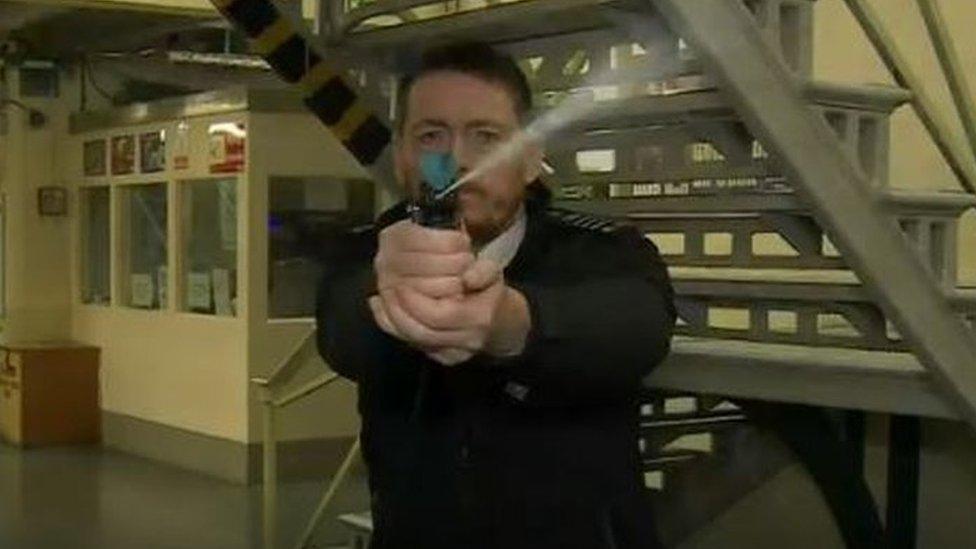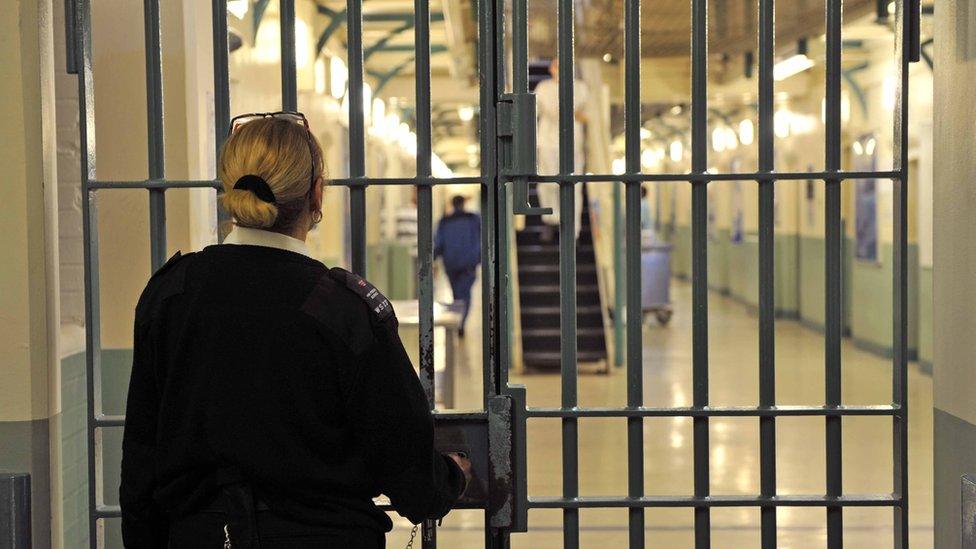Pepper spray deployed in prisons despite concerns for BAME inmates
- Published
Custodial manager Ash Bateman demonstrates the spray
A synthetic pepper spray is being deployed in 81 men's prisons despite warnings it will be used more against ethnic minority inmates.
Documents seen by BBC News show prison officials authorised its rollout a month after saying it would be stopped.
Campaigners want the government to halt the programme, claiming the spray may aid the spread of the coronavirus because it causes people to cough.
The Prison Service said it would be used only as a "last resort".
The Prison Officers' Association has been calling for the PAVA spray to be made available to help defuse outbreaks of violence and protect staff, amid record numbers of assaults in jails.
In 2017 and 2018, the chemical incapacitant was trialled in four prisons - Hull, Preston, Risley in Warrington and Wealstun, North Yorkshire.
But its wider introduction was delayed by concerns - which led to a legal challenge - that the spray would be used inappropriately.
BAME prisoners affected
An "equality analysis", conducted by the Prison and Probation Service (HMPPS), which is part of the Ministry of Justice, examined 182 cases in the pilot where the canisters had been drawn from an officer's belt or the spray squirted.
The study found that although PAVA was used more against white prisoners, who make up about three quarters of the jail population, black, Asian and minority ethnic (BAME) inmates were disproportionately affected.
"PAVA has been drawn or used more against BAME prisoners," the report said.
"The evidence from wider use of force would suggest that this trend will continue as rollout progresses," it added.
In April, Andy Rogers, deputy director of the safety and rehabilitation directorate at HMPPS, said work on rolling out PAVA would be paused "initially for three months" due to the impact of the coronavirus, which meant prisons had to implement emergency lockdown measures.
But in May, Mr Rogers reversed the decision, setting out his reasons in a letter to stakeholders - which the MoJ didn't make public.
"Due to the unprecedented challenges we are facing at this time I have taken the operational decision to extend the provision of PAVA to all adult male closed prisons," Mr Rogers wrote.
The Prison Service confirmed trained staff were carrying the spray in 81 of the 90 adult male "closed" prisons in England and Wales.
The Prison Reform Trust said the move broke commitments the MoJ had made to put safeguards in place before the rollout.
Peter Dawson, PRT director, said the spray caused people to cough and could be dangerous for people with breathing problems.
"It is not clear that the particular risks associated with PAVA use in prison during the pandemic have been considered or subject to expert medical advice," he said in a letter to Lucy Frazer, prisons and probation minister.
Mr Dawson wrote he was "alarmed" by reports from New York that a prisoner with asthma had died after being sprayed.
Dame Anne Owers, National Chair of the Independent Monitoring Boards, which carry out checks in prisons, said the roll out of PAVA was "highly regrettable".
"We understand that this was based on a fear that there would be widespread indiscipline," she said.
"Clearly this has not happened and violence has in fact decreased."
The Prison Service said the roll out of PAVA was an "exceptional operational decision".
It said officials would monitor whether it was being used disproportionately on BAME prisoners, adding that it should not be used on inmates in "respiratory distress", including those suspected of having Covid-19.
A Prison Service spokesperson said: "PAVA is only used as a last resort by specially trained prison officers. We monitor its use carefully, including for any disparities in the way it's deployed."
- Published15 December 2018

- Published9 October 2018
